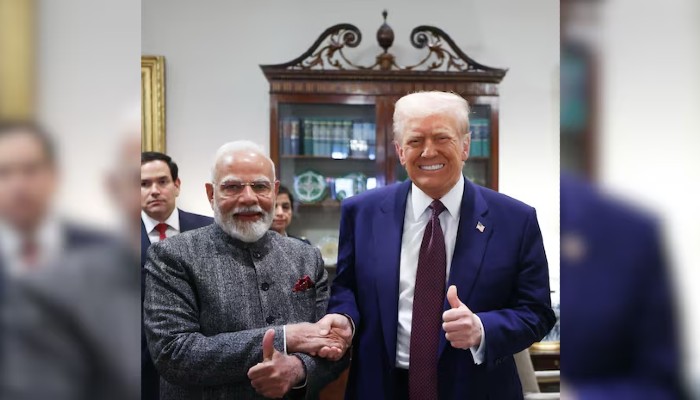India Urges IMF to Reconsider $1 Billion Aid to Pakistan Over Terror Concerns

Representative Image
Indian Defence Minister Rajnath Singh warns that IMF aid to Pakistan may support terror infrastructure, urging a review of the $1 billion loan package.
India calls on IMF to halt funding to Pakistan amid terrorism concerns
Indian Defence Minister Rajnath Singh has called on the International Monetary Fund (IMF) to reassess its recent $1 billion financial assistance to Pakistan, warning that the funds risk being diverted to support terrorism. His remarks come days after India launched military strikes under Operation Sindoor in response to a deadly attack in Kashmir.
Speaking at Bhuj Air Force Station in western India on Friday, Mr Singh praised the Indian Air Force for its role in the recent operations and criticised Pakistan’s use of international financial support.
"India believes that Pakistan will allocate a significant portion of IMF funding to rebuild terror infrastructure," Mr Singh said, urging the IMF to “rethink” its disbursement.
Military action and IMF criticism follow Kashmir attack
Operation Sindoor, conducted on 7 May 2025, was a retaliatory measure by Indian forces following a terror attack in Pahalgam, Jammu and Kashmir, on 22 April that left 26 civilians dead, many of them tourists. Indian authorities held Pakistan-based militant groups responsible.
According to Indian officials, Operation Sindoor involved targeted strikes on militant camps inside Pakistan, utilising precision-guided missiles such as the BrahMos supersonic system.
In his address to Air Force personnel, Mr Singh said the operation had “crushed terrorism nurtured in Pakistan” in just 23 minutes and warned that India’s response to cross-border terrorism had entered a “new normal.”
Concerns over misuse of IMF aid
Mr Singh’s statements follow the IMF's 14 May decision to release the second tranche of a $3 billion emergency loan to Pakistan under its Extended Fund Facility programme. The funding aims to support economic stabilisation efforts in the country, which is facing high debt, inflation, and a balance-of-payments crisis.
However, the Indian Defence Minister raised concerns that the assistance could indirectly finance extremist networks. "Any financial assistance to Pakistan is no less than terror funding,” he said, adding that “the funds India contributes to the IMF should not be used, directly or indirectly, to support terrorism in any country.”
He also alleged that Pakistan is planning to channel financial resources—including public funds—toward militant leaders and organisations designated as terrorist entities by the United Nations, including Jaish-e-Mohammed and Lashkar-e-Taiba.
Pakistan’s economic challenges and international support
Pakistan has long relied on international financial institutions to manage its economic challenges. The country has entered into more than two dozen IMF agreements since becoming a member in 1950.
The latest tranche of $1.023 billion is part of a short-term $3 billion deal agreed upon in 2023, designed to stabilise Pakistan’s economy and rebuild its foreign reserves. According to IMF projections, Pakistan’s foreign exchange reserves, which stood at $10.3 billion in April 2025, are expected to rise to $13.9 billion by the end of June.
The IMF has stipulated strict fiscal conditions, including achieving a primary budget surplus equivalent to 1.6% of GDP, requiring the mobilisation of significant additional revenues.
India signals further action if threats persist
Mr Singh described Operation Sindoor as a “trailer” and warned that India reserved the right to escalate its response if cross-border threats continued. “Pakistan has been put on probation. If their behaviour improves, that is acceptable. If not, the harshest action will follow,” he said.
He further claimed that militant infrastructure destroyed in the recent operation was already being rebuilt, citing intelligence reports that Pakistan intended to provide financial support to terror outfits.
The Defence Minister’s remarks underscore India's broader diplomatic effort to pressure global financial institutions into scrutinising how development funds are used in regions linked to extremism.
Context: India-Pakistan tensions and regional stability
India and Pakistan, both nuclear-armed nations, have fought three wars since their independence from British rule in 1947. Cross-border terrorism and territorial disputes, particularly over Kashmir, continue to fuel tension between the two neighbours.
Following the 2019 Pulwama suicide bombing that killed 44 Indian paramilitary personnel, India raised tariffs on Pakistani imports and took a more assertive stance on national security. Diplomatic and trade ties remain limited, and incidents of violence along the Line of Control periodically escalate into broader confrontations.
As India continues its campaign to isolate Pakistan diplomatically over terrorism concerns, the appeal to the IMF reflects New Delhi's strategy of leveraging international institutions to limit what it sees as Islamabad’s misuse of global financial support.
The IMF has not publicly responded to Mr Singh’s statement.

India Revokes Celebi Aviation Security Clearance Amid Turkey-Pakistan Ties
India cancels security clearance of Turkish firm Celebi Aviation over national security concerns following Turkey’s support for Pakistan in Operation Sindoor.
|2025-05-16

India-US Trade Deal: Trump Claims ‘Zero Tariffs’ as Jaishankar Urges Caution
US President Donald Trump claims India offered zero tariffs on American goods. India responds, calling the remarks premature amid ongoing trade negotiations.
|2025-05-16

Adani Airport Ends Lounge Access Partnership With DragonPass One Week After Launch
Adani Airport Holdings has ended its partnership with China-based lounge provider DragonPass, halting access for DragonPass users at Adani-managed Indian airports.
|2025-05-16

Çelebi Shares Plunge After India Revokes Clearance Over Security Concerns
Çelebi Aviation shares fall nearly 20% after India withdraws security clearance, halting operations at major airports amid national security concerns.
|2025-05-16

IndusInd Bank Uncovers ₹674 Crore Interest Misstatement in Audit Review
IndusInd Bank's internal audit reveals ₹674 crore wrongly booked as interest income and ₹595 crore in unexplained assets, prompting internal controls review.
|2025-05-16




